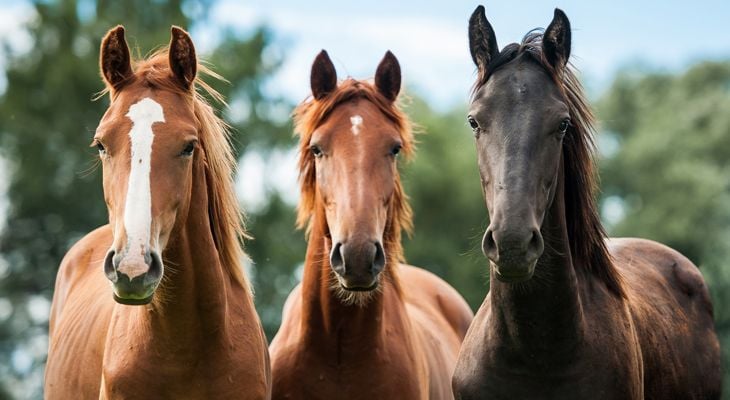Is your horse getting all of the nutrients it needs?
Read moreCall Us Today!

Owning a horse is a big responsibility. It requires a commitment of both time and money. The new owner should be prepared to spend time grooming, exercising, and caring for the animal, or assume the responsibility to see that the basic care will be performed daily. Unless the horse is kept on the owner's property, travel time to and from the stable must be considered. The costs of owning a horse can add up quickly as you provide shelter, feed, medical care, shoeing, and riding equipment.
If You Choose A Pet Horse
Before buying a horse for their children, parents would be wise to reinforce the child's commitment. Arrange with a local stable for lessons for your youngster. Give your child the opportunity to participate in supervised care of a horse for a month or two. If the youngster "sticks" with the chores of horse ownership, he or she is probably responsible enough to own one. Before you purchase a horse, decide where you will keep the animal and how much it will cost. In many instances the purchase price is not as much as the annual boarding fee. If you live on property that can support a horse - legally and physically - be sure that you have adequate stabling. If you live in a cold climate, you might want to consider boarding the animal, at least during the winter months, at a stable with an indoor arena. Riding in freezing weather is unpleasant and can even be dangerous for both horse and rider.
What Kind of Horse Should You Get?
Because riding is a team sport - of the horse and rider - it is important that you buy a horse that suits the temperament and style of the rider. A nervous, fearful rider should have a calm horse that will not react in kind. A child should not have a horse or pony that will bolt. An experienced rider will want a sensitive horse that responds to the slightest commands.Before you decide to buy a horse of your own, you should already have some riding experience or have taken riding lessons. Once you understand your riding abilities and limitations, you will be in a better position to choose a horse with a temperament that will suit you.You should also consider the type of riding you intend to do. "English" riders may want a purely pleasure horse for riding "on the flat." Other "English" riders may want a horse that will jump, or even one that can be taken on the hunt field. "Western" riders may want a horse to use for trail riding, working cattle, or other "Western" show events.Whichever style of riding you prefer, it is best if the first horse you buy is already "schooled." First-time horse owners should avoid younger animals that require a lot of training. An older horse that already has the skills you need is usually a better buy for the first-time owner and younger rider.
Please continue reading the below articles for more useful information on owning a horse.
-
What You Need to Know About Equine Nutrition
Category: Newsletter Library, Equine
-
How To Care For Your Horse When Temperatures Drop
Category: Newsletter Library, Equine
-
Diseases That May Affect Your Horse
Category: Newsletter Library, Equine
-
Coupling Equine Nutrition & Acupuncture
Category: Newsletter Library, Equine
Integrated medical care for horses has been shown to not only enhance their overall performance in competition, but benefit their everyday well being. According to the International Veterinary Acupuncture Association, acupuncture can be effective to both prevent illness and treat specific equine health
Read more -
Caring for Senior Horses
Category: Newsletter Library, Equine
With proactive veterinary care, horses can live well into their late 20s and early 30s. In fact, the average life expectancy for most horses is now between 28 and 33 years. Basic senior wellness care includes dental care, balanced nutrition, and hoof care. This care ensures horses remain healthy and
Read more -
Advances in Equine Breeding & Assisted Reproduction
Category: Newsletter Library, Equine
Assisted equine reproduction has opened up new possibilities in the equine sporting community for horses where this was once limited. With the help of your equine veterinary specialist you can determine if your horse is an ideal candidate for this process either to become artificially inseminated or
Read more -
Preventing Thrush in Horses
Category: Newsletter Library, Equine
Thrush is a bacterial infection, and one of the most common diseases, affecting horses’ hooves. You will likely know it when you see — and smell — it. The pungent, tar-like black discharge collects in the sulci, or grooves, along the sides of the frog, the triangular structure that covers about
Read more -
Select the Right Saddle
Category: Newsletter Library, Equine
The right saddle will make a significant difference for both you and your horse and ensure a safe, balanced and relaxing ride. Comfort is key; if the rear of the saddle is up after you cinch the saddle on your horse, or if the saddle wants to roll after you place it on, the saddle is not the correct
Read more
Contact Us
We look forward to hearing from you!
Location
Find us on the map
Centennial Equine Sports Medicine
7411 W U.S. Hwy 160
Pagosa Springs, CO 81147, US
Office Hours
8:00 am - 5:00 pm
8:00 am - 5:00 pm
8:00 am - 5:00 pm
8:00 am - 5:00 pm
8:00 am - 5:00 pm
Closed
Closed
